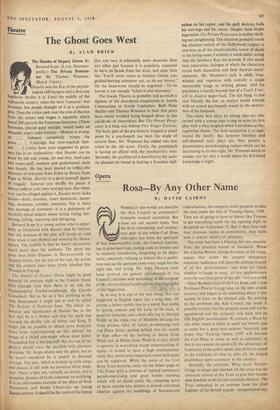heatre
The Ghost Goes West
By ALAN BRIEN The Hamlet of Stepney Green. By
t.. • logical cliff-hangers and a first-rate highbrow thriller it is. Until the middle of the eighteenth century, when the term 'romantic' was invented, few people thought of it as a problem Play. Then the critics took over the role of Hamlet from the actors and began a squabble which lasted 200 years in the Variorum footnotes. (These footnotes, played quite straight, would make an eloquent, angry radio feature—'Malone is wrong, Sir . .,, 'Johnson completely misses the Point , . .., 'Coleridge has over-reached him- self . . .') Critics have even suggested its great- ness lies in its malleability—that Hamlet can be acted by old and young, fat and thin, beef-cake and cream-pUff, amateur and professional, male and female. He has been proved to reflect the dilemma of everyone from Essex to Bevan, from Pope to Wilde. Hamlet is a do-it-yourself jigsaw of tragedy : however you shuffle the pieces it always reflects your own worried. face. But what- ever can be alleged against it, Hamlet never lacks action—duels, murders, court theatricals, haunt- ings, invasions, suicides, insanities. Nor is there any shortage of comment—it is a palimpsest of carefully-inked slogans about acting, ruling, bor- rowing, killing, marrying and intriguing.
Bernard Kops is a young author who is appar- ently so infatuated with Hamlet that he believes that the 'skeleton of the plot will knock us cold even when it isn't fleshed and muscled by Shake- speare. The trouble is that he hasn't disinterred Much more than the jawbone. The ghost has gone west from Elsinore to Hammersmith via Stepney Green, but the rest of the cast, the action and d the content have been firmly labelled Not Wanted on Voyage.
The Hamlet of Stepney Green might be good material for amateur night at the Yiddish Music Hall (though even here there is no role for Cholmondeley Featherstonehaugh, the Gentile Comedian). But as far as it has anything to do With Shakespeare it might just as well be called The Pericles of Petticoat Lane. The whole co- herence and significance of Hamlet lies in the fact that he is a Prince and that his uncle has Usurped the double role of father and King. It might just be possible to obtain some dramatic irony from superimposing on this tableau the image of a failed pop-singer whose dead father bequeathed him a herring stall. But the rest of the Pattern should trace the parallels .with absolute precision. Mr. Kops retains only the ghost, but as he wasn't murdered he is unable to demand revenge. The play, which is broken up with songs and dances, is left with no narrative drive what- ever. There is little wit, virtually no action, and a complete absence of lively comment on ariything. It is an unfortunate example of the effect of Wolf Mankowitz and Paddy Chayevsky on young Jewish authors. It should be the tomb of the heresy that any race is inherently more dramatic than any other just because it is popularly supposed to wave its hands from the wrist, and utter lines like 'You'll never move to Golders Green, you pickled-herring schnorrer yet, so do me favour.' On the head-stone should be engraved—'To be Jewish is not enough. Talent is also necessary.'
The Jewish Theatre is probably just as much a figment of the disordered imagination as Jewish Communism or Jewish Capitalism. Both Peter Shaffer and Thomas Wiseman in their first plays have wisely avoided being bogged down in this cul-de-sac of chauvinism. But The Private Prose- cutor is a long way behind Five Finger Exercise. The basic plot. of the psychiatrist trapped at pistol point by a psychopath has been the staple of several films. Mr. Wiseman has „added two new twists to the old screw. Firstly, the psychopath is having an affaire with the psychiatrist's wife. Secondly, the psychiatrist is horrified by the sadis- tic pleasure he found in locking a Freudian half- nelson on his captor, and the guilt destroys both his marriage and his career. Despite these bright ingenuities The Private Prosecutor is neither thrill- ing nor enlightening. This situation probably needs the absolute realism of the Hollywood toughie to convince us of the claustrophobic terror of death in the living-room. Certainly it needs better acting than the Salisbury Rep can provide. It also needs taut, naturalistic dialogue in which the characters reveal both themselves and their theories simul- taneously. Mr. Wiseman's style is oddly long- winded and repetitive with scarcely a single memorable image or striking phrase. And his psychiatry is hardly beyond that of a Teach Your- self to Analyse paper-back. The last thing, in this case literally the last, an analyst would attempt with an armed psychopath would be the destruc- tion of his fantasies.
Too many first plays by young men are con- cerned with a young man trying to write his first play with a they-laughed-when-I-sat-down-at-the- typewriter theme. The fatal temptation is to tape- record the family. But however formless and self-obsessed such plays are, they possess a documentary eavesdropping realism which can be fascinating in its own right. Mr. Wiseman seems to wander t6o far into a world where his first-hand knowledge is slight.






























 Previous page
Previous page